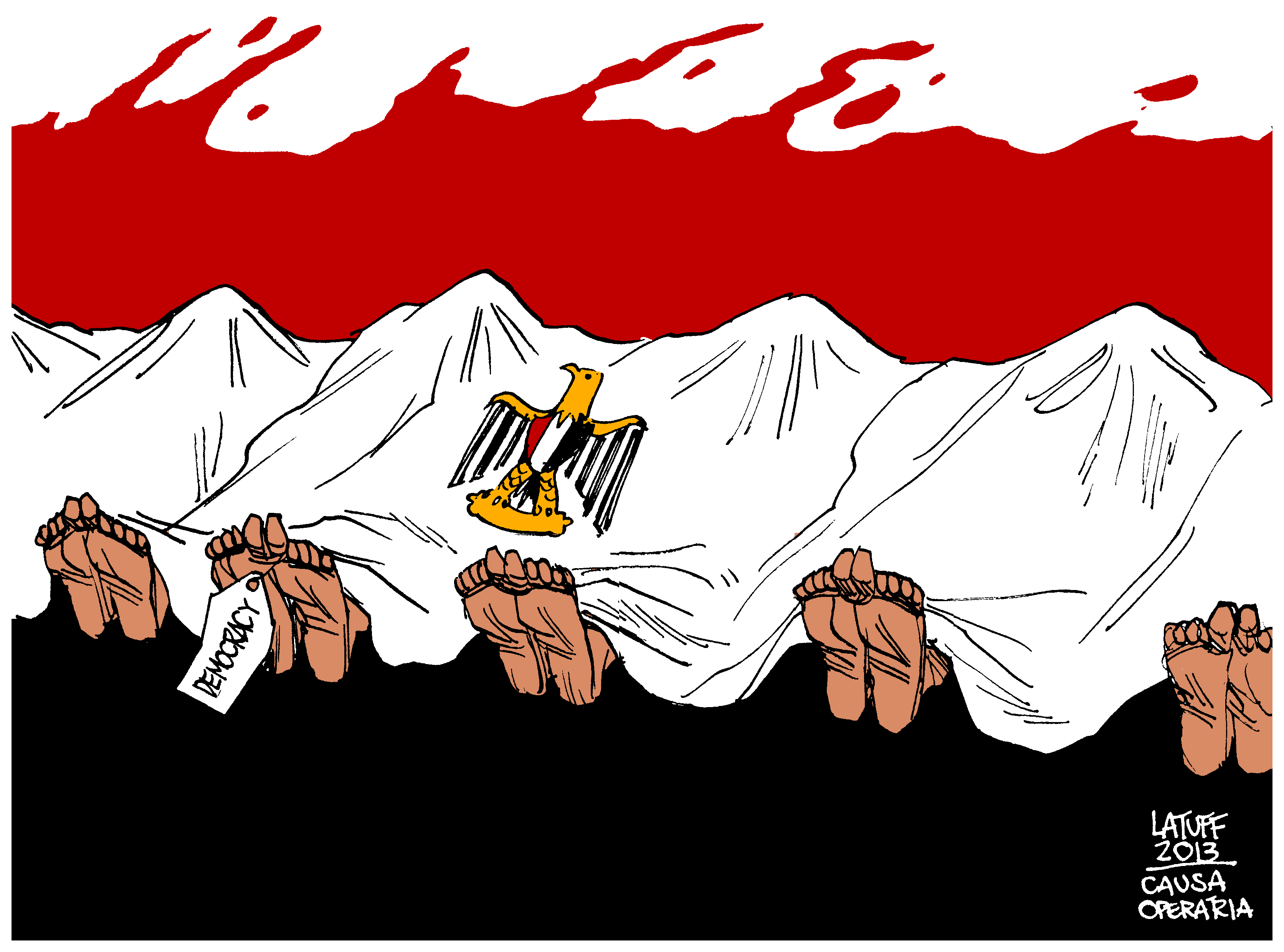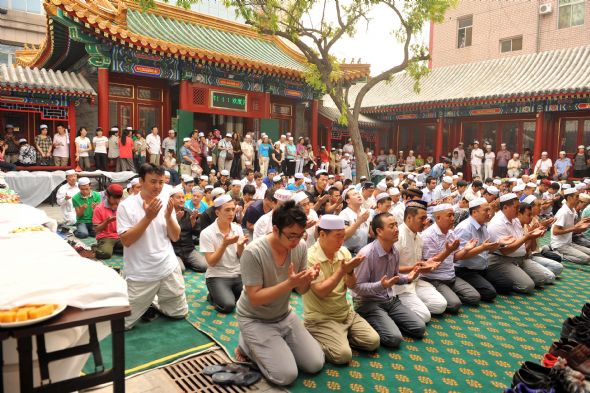
Prior to the 14 August clashes, the two main protest sites, al-Nahda and Rabaa al-Adawiya, were densely populated with women, children, and men who have been staging a 47 days-long peaceful sit-in to protest the removal of President Mohammed Morsy. Both sit-ins would at certain moments have a gathering of at least 115,000 people. On July 31, the Egyptian cabinet authorized the interior minister to "take all necessary measures to face these dangers and put an end to them within the framework of the constitution and the law." More than 40 international and national human rights organizations have warned the Egyptian Authorities not to use abusive and excessive force in the dispersal of protesters as Egypt's riot police have consistently responded with excessive and unlawful lethal force in dispersing demonstrations and have showed insufficient respect to protecting the right to life.
This warning resulted from previous massacres committed by the Egyptian Armed Forces and Security Forces against peaceful protesters just a few weeks before. On 8 July, 51 people were killed when lethal force was used on protesters gathered outside the Officer's club, followed by another massacre on 27 July when 74 people were killed, many shot in the head and chest.
On July 19, the EuroMid Observer for Human Rights issued a statement, signed by 11 international human rights organizations, demanding the Egyptian Authorities to protect human lives , emphasizing that "Egyptian security forces and the army are responsible for protecting all protestors, including both supporters and opponents of the deposed president. However, instead, a serious escalation in human rights violations - such as extrajudicial killings; arbitrary arrests; excessive use of force; and deprivation of freedoms of association, speech and expression – has been documented, targeting those who oppose the military's ouster of President Morsi. The Egyptian authorities have not only perpetrated such acts, but also turned a blind eye to their practice by others."
As the Egyptian cabinet was considering the pro-Morsi sit-ins a "threat to national security", human rights organizations and governments around the world kept urging the Egyptian Armed Forces to show restraint, to seek for a peaceful dispersal of the sit-ins and to avoid the escalation of violence.
Yet Egypt has been ruled since its independence by the generals who have since then committed severe human rights violations, showing little respect to human rights and dignity and acting with blatant disregard for human life.
Violating The Rights To Freedom Of Peaceful Assembly and Of Association Of The Protesters
The violence started around 6.30 a.m. on Wednesday 14 August as Central Security Forces (riot police) backed by helicopters and snipers, surrounded both sit-ins and fired tear gas from three different entries while heavy semi-automatic bursts of gunfire were heard.
Eyewitnesses' reports and video footage showed the sounds of successive gun shots and men in the crowd falling to the ground right away, which means that security forces were using live gunfire as snipers were firing tear gas and live ammunition from rooftops and helicopters. EuroMid researcher counted 42 victims in the first hour. Security forces shredded through the labyrinthine networks of tents and tarpaulin shacks, setting them on fire, with women and children still inside of them, causing many casualties and injuries. An eyewitness told EuroMid "a mother and her baby were crushed to death inside the tent", as severe chaos rose among the bloodshed.
The Egyptian Authorities have blatantly violated the Rights to Freedom of Peaceful Assembly and of Association of the protesters, which states that: "Everyone has the rights to freedom of peaceful assembly and of association [...] and these rights are essential components of democracy".
Responses to demonstrations and sit-ins must comply with international standards, even when some participants err by resorting to violence, including the use of firearms. International standards forbid the excessive use of lethal force, and do not justify the intentional murder of protestors by police or military snipers. The use of force must not exceed what is required to prevent the use of violence. Firing live ammunition at crowds is intolerable and should be considered a criminal act.
Extrajudicial Executions
The Egyptian Security Forces had announced one safe corridor from which protesters could exit the Rabaa sit-in parallel to Tayaran Street. Protestors and eyewitnesses stated that the security forces deliberately targeted protesters who were using the safe corridor, and attacked physically and verbally protestors as they were trying to escape. Men were executed on the spot while walking with their hands above their heads. The police unlawfully killed protesters who were clearly not engaged in any form of violence.
This was clearly not an attempt to break-up a peaceful sit-in, but a huge military operation against unarmed civilians. The use of deadly fire on such a scale and the killing of so many by the security forces prove that there was an intention to kill with no regard for people's lives.
Within less than 3 hours, the Field Hospital itself and the adjacent halls were completely full with corpses and injured protesters. The injuries varied from bird-shots to live bullets, burns and asphyxiation. Medical staff reported that the "majority of the bullet injuries were to the head, neck, and chest, as well that the angle of gunshot wounds indicated they were shot from above, as some of the deaths were judged to be targeted killings, as the position of the shots could only result in death".
The Egyptian Security Forces are guilty of extrajudicial executions, which are acts outside the realm of rule of law and hence deprive the targeted individual(s) of their right to life, as well as the right to defend themselves against charges against them. The killing of a person by governmental authorities without the sanction of any judicial proceeding or legal process is an unlawful punishment that violates the Declaration of Human Rights.
But who will hold the Egyptian Forces accountable? They have not opened or announced any investigation into any of those cases, which is contrary to the provisions of Principles on the Effective Prevention and Investigation of Extra-legal, Arbitrary and Summary Executions, which state the need to investigate cases of unlawful killings and that the "purpose of the investigation shall be to determine the cause, manner and time of death, the person responsible, and any pattern or practice which may have brought about that death," and that "the body of the deceased person shall not be disposed of until an adequate autopsy is conducted by a physician".
But as death tolls rose, the Egyptian authorities attempted to cover up the numbers of the massacre. The police are refusing to register the cause of death as murder and push families to list the cause as accidents or suicide. The EuroMid researcher was shown official certificates of death were the cause of death was not mentioned.
Places designated for the sole protection of civilians, such as hospital zones, should not be the object of military operations
Additionally, the Egyptian Security Forces imposed a siege on the Rabaa Field Hospital, preventing ambulances from coming through from the very beginning of the violent crackdown. At least one ambulance medic was shot in the head. Snipers were targeting anyone coming in and out of the hospital. It is a criminal act to deliberately attack a hospital or other medical units, whether civilian or military. Medical personnel in general may not be attacked.
According to the Basic Principles on the Use of Force and Firearms by Law Enforcement Officials, when whenever the use of force and firearms is unavoidable, law enforcement officials shall ensure that assistance and medical aid are rendered to any injured or affected persons at the earliest possible moment. This obligation was violated by Egyptian Forces, specifically by imposing a siege on the Field Hospital, and blocking its entrance, and eventually setting it on fire.
Unlawful Use Of Teargas
Rules under international customary law ban the use of certain weapons as an instrument to contain assemblies. Central Security Forces (riot police), backed by the Egyptian Army, fired teargas canisters and gas bombs directly at the densely populated sit-ins, causing severe cases of asphyxiation and injuries among women, children and elderly. Eyewitnesses reported that as a result of the excessive use of teargas, the stampede rushed forward, and some people were crushed to death. It appears that security forces firing tear gas at the stampeding protesters exacerbated the situation, as people could not see a safe passage and may have been the cause of some of the deaths.
No Respect To Human Life Right and Dignity
The Egyptian authorities may decide, in accordance to national law, to disperse a demonstration, they are bound to comply with a series of obligations, namely, they should respect and protect the life and security of all personas. The Egyptian Security Forces have clearly failed in safeguarding Egyptian lives.
Considering the evidence in the case of Egypt, security agents used lethal force when it was not necessary to protect lives or prevent serious injury and hence clearly violated the international law and standards. They have used live ammunition at crowds; they have extrajudicially killed dozens; they have used excessive teargas, resulting in some people crushed to death and hundreds asphyxiated; they have targeted medical personnel, setting a hospital on fire, and they have not spared women and children. Men were executed on the spot while walking with their hands above their heads. More than 700 have been victims of arbitrary arrests and at least 1500 are missing until this moment.
While human rights organizations are overwhelmed with the magnitude of the Rabaa massacre, a new one followed just 3 days later. Hours after Egyptian army chief General Abdel Fattah El Sissi urged the Muslim Brotherhood to pursue dialogue instead of "terrorism," 52 prisoners were killed while being transported to a prison outside Cairo. The Egyptian Security Forces are prohibiting human rights organizations and journalists from investigating this new incident. Egyptian security forces are guilty of a pattern of excessive and unwarranted lethal force, which have led to an unlawful mass massacre, unprecedented in modern Egyptian history.
On 15 August, the Office of the United Nations High Commissioner for Human Rights Navi Pillay stated that "the number of people killed or injured, even according to the government's figures, point to an excessive, even extreme, use of force against demonstrators. There must be an independent, impartial, effective and credible investigation of the conduct of the security forces. Anyone found guilty of wrongdoing should be held to account" she said.
Since the deposal of President Morsy on July 3, at least 1500 people have been killed in Egypt as a result of the erupted violence. But who will investigate these violations of national and International laws? Interim Prime Minister Hazem el-Beblawi, on Egyptian TV, defended and justified the clearing as "necessary to restore the security of Egyptians" and praised the Ministry of Interior and police for showing "restraint to the maximum level".
While Egyptians rose in January 25 to put a halt to all these violations, it is clear, one massacre after the other, that the new military-installed regime does not appear to be interested in safeguarding Egyptian human rights. The path to democracy has vanished under the bloody boots of the army.
Hanine Hassan is a Researcher in Human Rights violations and doctoral student studying aspects of mental torture and humiliation under occupation. She tweets at @hanine09.













